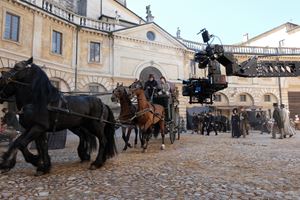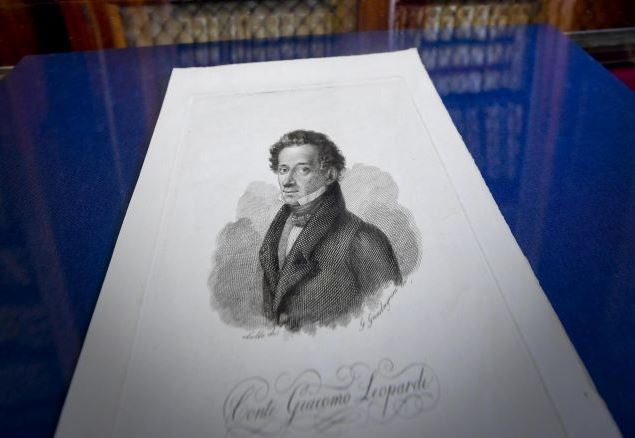By entering the name of Giacomo Leopardi in the best known of the search engines on the eve of the release of one of his many cinematographic readings, the one broadcast on 7 and 8 January 2025, on Rai Uno, a TV miniseries in two episodes signed by Sergio Rubini, we realize that one of the questions that is most frequently asked to the electronic brainiac who knows everything, or deludes us into knowing everything, is: “Did Giacomo Leopardi have a hump?”.
This detail gives the idea of how much the figure of one of the most famous Italian poets is associated in the collective imagination with a series of clichés: a state of health heavily conditioned by physical disharmony, a narrow place in which to feel confined and in which take refuge in the “crazy and desperate study”, a certain isolation.
But is it true that he had a hump?
One wonders if and to what extent Leopardi the man was really this too and if and to what extent it is reductive to anchor his genius to this. We looked for some answers, with the help of Giorgio Panizza, very recent president of the Maria Corti Foundation, professor of Italian Literature in the Musicology degree course at the University of Pavia based in Cremona, as well as a Leopardi scholar and brilliant popularizerwhich plays the game of starting from that question about the hump thrown like a message in a bottle to the Internet.
«What is known and documented», explains Panizza, smiling at the question «is that Giacomo Leopardi suffered from a serious deformity of his skeletal posture: we are certain of this because in the nineteenth century, in the midst of the positivistic age, his body was exhumed and Some studies of a somewhat Lombrosian type have been carried out. However, we also know that these problems were not there at birth, they arose over time, with a progressive degeneration: in childhood and early adolescence they had not yet manifested themselves and this allows us to understand how his personality also clashed with what was happening to him.”
Some have gone so far as to attribute all this to a wrong posture in the study, others have tried to identify Leopardi’s state with pathologies which were given a name long after his life, but it is probable that to understand Leopardi’s complex personality and his genius doesn’t need to go into the details of his biographism.
Recanati, the library, the family
However, it cannot be denied that the historical-social context of Recanati and the family played a role in influencing his personality: «Recanati, a peripheral province of the Papal State, was at that time a marginal place linked to archaic social structures: Giacomo is the eldest son of a family of ancient local nobility, closely linked to the lifestyles and social relations of the ancient regime, today we would say municipalist, that is, attached to the idea of the importance of holding a position of economic and social pre-eminence in the city. The Leopardi family is in sight, the father Monaldo, who will never leave that world, knows that the family has a social role and must maintain it. In a context of poor farmers he feels an almost socio-cultural duty to express himself. This is why he set up the library.”
Still visitable and remaining as it was, it is also a fascinating place where time seems to have stopped when Giacomo grew up there, cultivating, from a very young age, very varied interests: linguistic, scientific, philological, philosophical. «Due to the fact of being the eldest son, Giacomo would have been destined to continue that social role, but this does not happen because from a certain point onwards his physical conditions are not such as to support that prospect, so much so that the family thinks of sending him towards ecclesiastical career, which James will refuse.”
However, it is in this context that the investment made in the young Giacomo’s studies is explained and in which the relationships with his father are intuited: «The social and emotional investiture that falls particularly on the first-born male is evident; Giacomo is educated by private tutors. He certainly has a profound mutual emotional relationship with his father, with elements of conflict that we can intuit in a Freudian way, without knowing the details. Monaldo is a rather disordered personality, tending to be libertine, with an undeniable ambition which however he doesn’t know how to materialise. The library itself is a reflection of this, put together through accumulation without the person creating it knowing how to distinguish what is important from what is not, but is an emotionally present father. It somehow counterbalances the mother’s lack of affectivity, about which we know almost nothing, except what can be gleaned from Giacomo’s perhaps somewhat loaded testimonies: there is certainly a strong religious rigorism, also testified by Paolina, sister of Giacomo and other family testimonies: we perceive a severe religiosity characterized by a strong formalism, probably also due to the fact that she was a very culturally limited woman. He had ten children, many of whom died early, but as was the custom of his time in noble families he had contributed little to their education.”
Moreover, it was known that the noble mothers of the eighteenth century, according to the custom of the aristocracy ofancien régimehad very little relationship with their children as soon as they were born and no influence on their education: the newborns were immediately given to wet-nurses and then soon entrusted to convents and boarding schools for their education: «There is no doubt that even in the In the case of the Leopardi family, the affectivity continues, as has been said, even when Giacomo was born at the end of the eighteenth century, on his father’s side. Affection as we understand it today was born with the bourgeois family, we also see it in the Manzoni household, but Milan is something else: the Milanese innovations, which experienced Enlightenment perspectives with Maria Teresa and Giuseppe II and which for a period was the capital of Italy, they arrive in Recanati after 50 years.”

Around Italy
Recanati is part of the Papal State where everything evolves more slowly but is peripheral to the capital Rome: «This means that it has a different cultural line compared to Rome, connected to Romagna classicism and the Bolognese line which is the same as Vincenzo Monti’s, more innovative , by which Leopardi is influenced. This is also why when Leopardi goes to Rome – the first trip of his wanderings – he does not feel at home: Giacomo leaves from Recanati in the difficult physical conditions we were talking about, in search of the cultural ferment of the big city: but, while his father is convinced that Giacomo is not in a position to live in the world, the son is aware of his potential and is ambitious: he always understands perfectly which are the avant-garde places, his problem is that he always walks ahead of everyone: he never finds himself in tune because he is always one step ahead.”
The Enlightenment is difficult for him, positivism has a rigidity in which he does not recognize himself, he finds the Risorgimento enthusiasms of the romantics from whom he is very far away naive: he goes to Milan, Florence, Naples but doesn’t feel at home anywhere. «The place where he feels best temporarily is Bologna, where however he comes into conflict because the classicist writers criticize the innovative language of the songs, but it is still the place where he feels most at ease, more than in Milan and Rome. The center he most points to is Florence, he goes there with the Moral operettaswith what he is writing and which will take the form of You singand there he finds the bitterest disappointment: understands that the‘Anthology of Viesseuxat that time, after 1825, is the avant-garde literary society: everyone recognizes him, appreciates him, even helps him materially by allowing him to live there for a year by paying for his stay with one excuse or another, but there is no real harmony because Leopardi sees further ahead. What he writes does not fall within the formal canons”.
A genius ahead of his time
The meters of his poetry have nothing to do with the even lines of much nineteenth-century poetry: «He makes the free song, then in the You sing he puts everything: the old, the new… and it happens because his work was born within classicism, therefore the recognition of poetry as a transformation of previous models, but his inspiration, his relationship with creativity is such that the models are not enough: the romantics object to the illusion that poetry can be created from scratch, as if there were no past that cannot be ignored, and to narcissism”.
His short life (he died at the age of 39) lived between the last part of the eighteenth century and the first half of the nineteenth century projects him, in terms of mentality and research, already almost as a precursor of the twentieth century: «As Leopardi gradually proceeds and passes from Songs, which came out in 1824, at Moral operettasi ai You sing, it’s as if the society that begins to appreciate him every time is displaced by what Leopardi does immediately afterwards: it is disappointed because what arrives is never what it expects from him. Leopardi’s origins as a man of letters are very early, but his reasoning and awareness grow over time and mature in a path of philosophical reflection that in some ways goes beyond his time and anticipates Nietzsche and the existentialism of the twentieth century. It’s hard to imagine a nineteenth-century reader understanding this. When he writes To Italyhis contemporaries expect Leopardi to become the singer of the Risorgimento, in Bologna in the few months of the Republic they appoint him delegate of Recanati, a position which he declines with a delightful letter of thanks. He is already far beyond, writes the Night song of the wandering shepherdThe Dialogue of Nature and an Icelanderthe Broom: apart from Antonio Ranieri who loves him, perhaps in a sense of latent homosexuality and protects himLeopardi remains unique, isolated but not because he is closed in his own world, but because his time cannot keep up with him.
Questions about the meaning of life, an existentialist ante litteram
«The broom it is an extraordinary text from both a poetic and philosophical point of view: there is no doubt that Leopardi at that point had developed the conviction of the senselessness of existence from which he will no longer move, and yet the awareness of not being able to give a satisfactory answer to why we exist – perhaps also thanks to what he calls “my black melancholy”, which today we would perhaps call depression – never leads him to conceive the idea of voluntary death nor to total closure, to the refusal of any activity: after Operettes he is convinced of the uselessness of poetry and yet he composes To Silviaone of its best things. And he says it: “I felt like I used to”: this is the thing that shocks him a little and keeps him alive a little: the fact that life shouldn’t exist but instead does. In this sense it is existentialist: I live, maybe I like to eat ice cream, I look at the moon.”
Does it make sense to look for the hill of Infinity?
One wonders: does it make sense to physically look for the hill ofInfiniteput the tag on it? «Now it’s a Fai place and those from Fai are my friends, they do beautiful things. But we must not forget that It doesn’t matter so much whether the inspiration comes from that place or another, it could even be entirely mental that limit placed on the gaze, which Leopardi may have naturally experienced in real life, and then reconsidered it without actually being in front of a hedge. Nello Zibaldone he says many times about restricted places through which the gaze passes, which in preventing us from seeing things unleash the imagination: that work of “pretending the infinite” happens in many situations beyond reality and it would be a bit penalizing to reduce all purely biographical, as if the‘Infinite had been born only because Leopardi had had the opportunity to sit right there on a certain bench.”
If only because to the rest of the world, sitting on that bench for a thousand lives, the inspiration for the‘Infinite and above all his verses would not have come.








